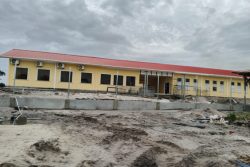During the last fortnight, Prime Minister Ralph Gonsalves of St Vincent & the Grenadines has circulated what many might have found a curious document to be emanating from a Prime Minister’s office, and certainly one more reminiscent of the days of intense ideological confrontation of the mid-1970s into the 1980s. In it he declares the existence of a foreign-local linkage designed to “destabilize” his government as new general elections draw near, most likely towards the end of this year. The local link is said to be the opposition New Democratic Party (NDP), and the foreign link a combination of United States and British-based personnel and organizations hostile to the domestic and foreign policy arrangements of Gonsalves’ Unity Labour Party (ULP) government. And he draws a connection between their activities and the activities of various agencies out of the United States which sought to destabilize the government of Michael Manley after he set out on the path of democratic socialism for Jamaica.
Gonsalves claims that the American group, CoHabitat and the British-based group Strategic Communications Laboratories (SCL) have embedded themselves with the New Democratic Party, using as their main connection former Prime Minister James Mitchell, whom Gonsalves fought vigorously between the 1998 election won by the NDP by a slim margin, and the 2001 election in which the Unity Labour Party triumphed for the first time. The ULP repeated its earlier victory in 2005. But there can be no doubt that the intense pressure, involving the intermediation of Caricom governments between 1998 and 2001, which Gonsalves placed on Mitchell during that period, left a bitter taste in the latter’s mouth.
The NDP, led by former Caribbean Development Bank official and economist, Arnhim Eustace, but undoubtedly with the active support of Sir James, turned the tables on Gonsalves in the referendum last November on a new constitution for the country, which Gonsalves seems to have believed would have had the support of the opposition. He felt betrayed when the support given by the opposition in the House of Assembly when the matter was first introduced was not sustained.
The decisive defeat of the ULP by the NDP, by a margin of 55% to 44%, virtually the same kind of majority by which the ULP had won the last two elections, undoubtedly came as a surprise to Gonsalves, and in a return to earlier times, has led to increasing bitterness between the two parties, as new elections draw near. Gonsalves now claims that the external interventions by CoHabitat and the SCL are deliberately designed to create an atmosphere of fear for the future of the country as a democracy, and for the possible intervention of Venezuela in St Vincent at Gonsalves’ behest, leading to further interventions by Libya and Iran, countries with which the government has struck up close relationships as it seeks to advance critical development projects.
One of these projects, the construction of a new airport to permit St Vincent to entertain larger aircraft, a dream of most leaders of St Vincent for many years, has created internal dissent as the government has sought to acquire land for this purpose, and Gonsalves accuses CoHabitat of whipping up this dissent for the electoral benefit of the NDP. On the other hand, he has asserted that Sir James Mitchell is a member of the Board of SCL, a claim which Mitchell has not denied. Mitchell would no doubt hark back to the mid 1970s and ’80s, in particular, during and after the reign of the People’s Revolutionary Government of Grenada, when it was clearly the case that the conservative parties of which the NDP was one, and the socialist or social democratic parties of the region linked respectively with European conservative parties in the International Democratic Union and the European Social Democratic parties in the Socialist International. In addition, he would insist that Gonsalves himself had no objection to establishing strong external linkages with the then world socialist system headed by the Soviet Union, and exemplified in the Caribbean by the close links of socialist parties with Cuba. He no doubt takes the view that Gonsalves should not now have any objection, in principle, to assistance from ideological allies from outside.
Mtichell therefore, not unlike the late Sir John Compton who, in his last fling at the polls, drew Taiwan into St Lucia’s elections, now seeks to fortify the lead which the NDP would seem to have gained over the ULP in the referendum, by external connections known to be skilled at successfully electioneering in other countries. It is alleged that the SLC gave substantial assistance to Prime Minister Denzil Douglas in St Kitts’ recent elections, and Mitchell would argue that Douglas’ St Kitts Labour Party has always been taken to be of the same political ilk as Gonsalves’ ULP.
Reports emanating from St Vincent seem to suggest that Gonsalves, going for a third term in the next general elections, faces an uphill task to reverse the numbers which obtained in the referendum. In addition, the decline of the banana industry in the island, as well as the effects of the recession that has hit both Britain and the United States, leave an economy which has not gained any real buoyancy since the country’s last general elections in 2005. The efforts of Gonsalves to seek assistance from Venezuela and Libya, and from Iran, Turkey and other countries mainly for the construction of the airport and paying land owners, while assisting the Prime Minister in his developmental policies, have not done much to enhance the possibilities of employment in St Vincent.
In that context, he may well be justified in feeling that any serious external effort by the opposition, with substantial help from the external groups which he has named, could well push them over the top. He may therefore not be calling wolf, but recognizing a real threat to his party’s future longevity in power.








